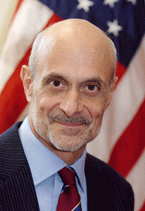Guess What Happened While You Were Away
The U.S. House of Representatives/Senate
panel waited until everybody went to the beach and then agreed to allow
tests on new technology to be completed before requiring inspections on
cargo.
So as you read this, that House Transportation
Security Bill from this past January that would have required all cargo
on passenger jets be inspected within three years and all U.S.-bound maritime
cargo to be scanned for nuclear bomb components within five years may
be out the window, finished.
No technology for such scanning exists at
a reasonable cost is the thought, although pilot projects and various
feasibility studies are ongoing.
Screening air cargo would cost $3.6 billion
over the next decade and screening all ship cargo would cost even more,
maybe hundreds of billions.
 Lawmakers
have agreed to allow the U.S. Secretary of Homeland Security to waive
the mandate in two-year increments. Lawmakers
have agreed to allow the U.S. Secretary of Homeland Security to waive
the mandate in two-year increments.
Also since after all security is in the
title, the USA Homeland Security Secretary will have to certify that whatever
scanning system is decided upon meets technological and logistical requirements.
Sens. Daniel Inouye, chairman of the Commerce
Committee, and Joseph Lieberman, chairman of the homeland security committee,
had urged that tests on the new technology be completed before inspections
are required of 100 percent of cargo.
While all of this is going on, the newspaper
New York Daily News put things somewhat in focus in a reality
check editorial Monday July 23 saying:
“Insanity is doing the same thing
over and over and expecting different results.
The craziness stops now.
Never again, no matter how he tries to spin
his decisions, will New York expect anything different from Homeland Security
Secretary Michael Chertoff when we apply for terror funding.
The outrageous reality is that America's
No. 1 target, the place that is at the top of Al-Qaeda's hit list, has
not gotten and will likely never get a proper share of anti-terror funding
out of Chertoff.”
Not exactly a ringing endorsement of a widely
disliked and mistrusted government agency headed up by an individual who
has been described as reminiscent of the comic book character “Skeletor
”by detractors.
As this last week of July drags on, House
and Senate lawmakers and their aides will continue behind-the-scenes negotiations
on legislation implementing unfulfilled recommendations of the 9/11 Commission.
But by focusing now on which federal agency
manages grants for among other things, transportation security, how to
help local governments buy interoperable communications equipment, and
whether a provision will be included that gives people immunity if they
are sued for reporting on suspicious activity around transportation networks,
U.S. legislators may end up once again passing the buck.
We wonder if any of us can afford to pay
the price for actions that will be taken in this highly charged political
atmosphere?
Meantime at a critical time for cargo security
legislation that will reverberate and affect business globally, people
among other things are talking about days at the beach, Beckham in Los
Angeles and the shortage of fresh lobster based on demand on the U.S.
east coast.
Go figure.
Geoffrey
|



